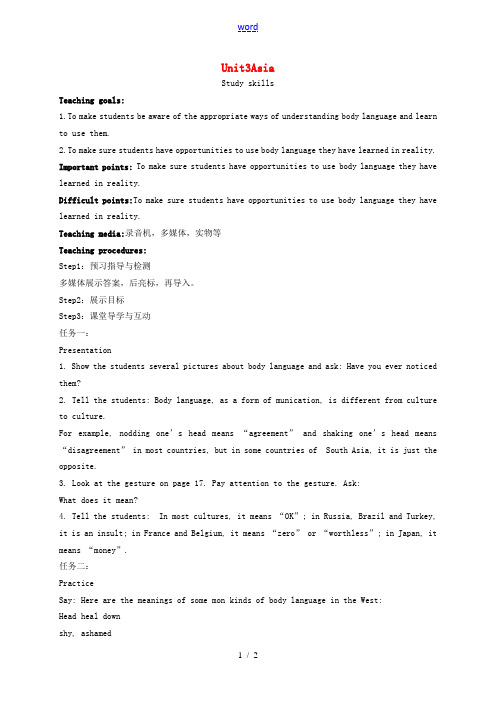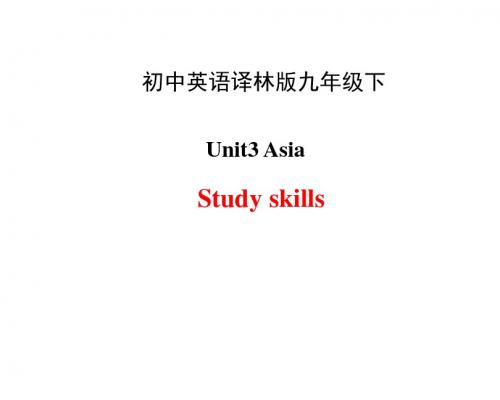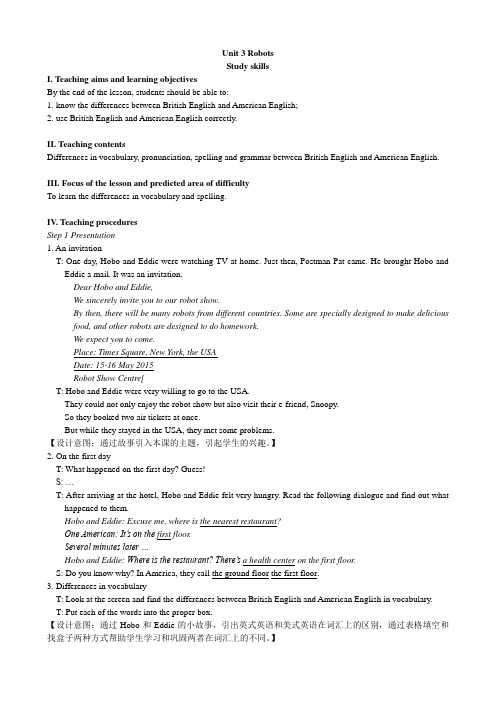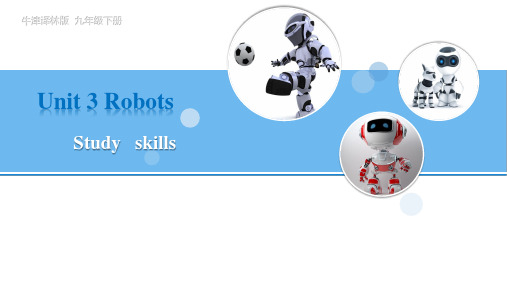最新江苏牛津译林版九年级英语初三下册9BUnit3 Study skills课件
九年级英语下册《Unit 3 Asia Study skills》教案 牛津版-牛津版初中九年级下册

Unit3AsiaStudy skillsTeaching goals:1.To make students be aware of the appropriate ways of understanding body language and learn to use them.2.To make sure students have opportunities to use body language they have learned in reality. Important points: To make sure students have opportunities to use body language they have learned in reality.Difficult points:To make sure students have opportunities to use body language they have learned in reality.Teaching media:录音机,多媒体,实物等Teaching procedures:Step1:预习指导与检测多媒体展示答案,后亮标,再导入。
Step2:展示目标Step3:课堂导学与互动任务一:Presentation1. Show the students several pictures about body language and ask: Have you ever noticed them?2. Tell the students: Body language, as a form of munication, is different from culture to culture.For example, nodding one’s head means “agreement” and shaking one’s head means “disagreement” in most countries, but in some countries of South Asia, it is just the opposite.3. Look at the gesture on page 17. Pay attention to the gesture. Ask:What does it mean?4. Tell the students: In most cultures, it means “OK”; in Russia, Brazil and Turkey, it is an insult; in France and Belgium, it means “zero” or “worthless”; in Japan, it means “money”.任务二:PracticeSay: Here are the meanings of some mon kinds of body language in the West:Head heal downshy, ashamedHead raisedconfidentLooking downdishonest Looking awaybored, uninterestedLooking in the eyesfriendly, interested, honestCrossed armsnot open, unfriendly, angryOpen armsopen, friendlyHands on the sidesimpatient, angryTell the students: Sometimes the words a person uses do not match his or her body language. When this happens, it is often more important to look at their body language.任务三:MatchMatch the pictures with the meanings. Write the correct letter in each box. 要求学生完成第17页练习,并校对答案。
(牛津译林版)九年级英语下册 Unit3 Asia_Study_skills_精品课件

Facial expressions
Body Language
Gestures
What do the following facial expressions mean?
smile
cry
happy
surprise
angry
fear
What do the following gestures mean?
A. lay B. lied C. lies D. lie
7.Tony gets up ____A___ early _______ he can
be the first one to get to his classroom.
A. so; that
B. such; that
C. too; to
D. enough; to
8.There are ____A___ things in your room. Stop
buying anything until you can clean up
your room.
A. too many B. less
C. too much D. so much
Homework
Remember the body language we learnt today and put them into practice.
初中英语译林版九年级下
Unit3 Asia
Study skills
What is body language?
Body language is the movements or positions of our body that show other people what we are thinking or feeling.
牛津译林版九年级英语下册同步作业第三单元Study skills

Unit3 Robots Period 7 Study skills命题人: 审核人: 班级________姓名_______学号_________(友情提醒:请家长督促孩子在复习完当天课堂所讲内容后,闭卷完成下列作业)【家长反馈】是否复习后独立完成作业(是、否) 是否完成课前预习(是、否)作业完成时间_____________( 分钟 ) 家长签字_________________【自主学习】一、默写下列短语,并用红笔批改订正。
1. 收拾妥,整理好______________________________2.对……感到满意 ____________________3. 给你接通(电话)________________4. 英式英语与美式英语的一些不同之处 __________________________5. 去旅行_________________________6.和他的机器人一起去看场电影 ______________________7. 太多的麻烦_________________________ 8. 出毛病_________________________【基础训练】一、根据所给中文提示完成单词。
(每空一词)1. We are looking forward to _________ (探索) outer space.2. Her answers __________(使……满意) all the teachers and passed the test.3. We ’ll certainly set up a ________ (完全的) modern industrial system.4. Nowadays, more and more families have their ________ (私人的) cars.5. You ’ll look smart in the suit which is _________ (平整地) ironed.二、根据句意,用所给词的适当形式填空。
牛津初中英语 新教材 九下 9B Unit 3 教案

课题9B Unit 3 Comic strip and Welcome to the unit学习目标知识目标掌握本课时的重点词汇。
能力目标能谈论机器人的用途。
情感目标通过学习有关机器人的词汇,了解机器人的一些优势学习重点谈论机器人的用途。
学习难点正确的表达机器人的优点。
Step 1 New wordsrobot n.机器人post vt. <英>邮局=<美>mailexplore vt. 探索,讨论outer space n. 太空brain n. 大脑whatever pron.任何,一切事物Step 2 Lead-in1. Have you seen robots in the films?2. What kind of robots do you know?3. What do you think robots can do for you?Let students look at the picture then read them aloud.Step 3 ExercisesDo you know how robots could help us? Match each phrase with the correct picture.A help with homeworkB explore outer spaceC do dangerous jobsD help with houseworkStep 4 DiscussionAmy is asking Daniel how robots could help us in our daily lives. Work in pairs and talk about your ideas. Use the conversation below as a model.Step 5 Presentation9B Unit 3 Robots参考答案comic strip and welcome to the unit二、用所给词的适当形式填空。
译林版英语九年级下册教学教案Unit 3 Study skills

Unit 3 RobotsStudy skillsI. Teaching aims and learning objectivesBy the end of the lesson, students should be able to:1. know the differences between British English and American English;2. use British English and American English correctly.II. Teaching contentsDifferences in vocabulary, pronunciation, spelling and grammar between British English and American English.III. Focus of the lesson and predicted area of difficultyTo learn the differences in vocabulary and spelling.IV. Teaching proceduresStep 1 Presentation1. An invitationT: One day, Hobo and Eddie were watching TV at home. Just then, Postman Pat came. He brought Hobo and Eddie a mail. It was an invitation.Dear Hobo and Eddie,We sincerely invite you to our robot show.By then, there will be many robots from different countries. Some are specially designed to make delicious food, and other robots are designed to do homework.We expect you to come.Place: Times Square, New York, the USADate: 15-16 May 2015Robot Show Centre[T: Hobo and Eddie were very willing to go to the USA.They could not only enjoy the robot show but also visit their e-friend, Snoopy.So they booked two air tickets at once.But while they stayed in the USA, they met some problems.【设计意图:通过故事引入本课的主题,引起学生的兴趣。
牛津英语译林版9BUnit4 Unit 3 Study skills--(共12张PPT)

Practice
1. Pay attention to these words’ pronunciation, and read them together . 2. Do the exercises on page 47 and check the answer .
Homework
1. Read the words and complete the exercises . 2. Preview task .
American English
favourite , humour , neighbour , harbour , behavour , honour
centre , metre
favorite , humor , neighbor , harbor , behavor , honor
centre , metre
Pay attention to this word : dance [dɑ:ns] (British English ) dance [dæns] (American English )
British
can’t
[kα:nt]
fast
[fɑ:st]
class
[klɑ:s]
American
[kænt] [fæst] [klæs]
There are some differences between British English and American English .
British
American
farm
[fα:m]
[fα:rm]
hair
[ ə ]
[ hɛər ]
forty
[ˈfɔ:ti]
江苏省张家港市第一中学九年级英语牛津译林版下册 Uni
Spelling (拼写)
British English
American English
maths
math
favourite
favorite
metre
meter
theatre dialogue travelled
theater dialog traveled
grammar
American English
British English
Do you have …?
Have you got …?
My friend just arrived.
My friend has just arrived.
on the team
in the team
on the weekend
at the weekend
I’ll see you Monday I’ll see you on Monday
Write me soon Write to me soon
expression
Expression(表达)
British English American English
chips trousers
lift film Fizzy drink sidewalk
9B Unit3 Study skills
British English and American English
Lead-in
Boy (American): What can I do for you ? Girl (British): I’d like a piece of rubber , please ! Boy (American): …Er, a piece of eraser ? 0.5 dollar, please ! Anything else ? Girl (British): I’d like some sweets, too. Boy (American): No problem. All the candy we sell is sweet. Girl (British): I see, so you sell sweet sweets!
9B Unit3 Study skills课件牛津英语_初三_九年级
A Competition
Task 4
Is Daily Homework Necessary or Not ?
Is daily homework necessary?
useful expressions If…, although…, …because …, so that, For example, without, It is … to do … learn some bad habits, such as, review old knowledge, gain new knowledge, enable the teachers to…, boring, many times, a waste of time, a saying goes, duty, pass the exam, achieve greater success,
The basic structure of the passage
Beginning: 1) In my opinion, it is … to do our homework every day. 2) Nowadays, more students are complaining about
▪ (4) 表示举例的过渡词 ▪ for example ▪ such as, like ▪ (5) 表示递进的过渡词 ▪ as well ,also; too, either, ▪ what‘s more (而且) ▪ not only … but also ▪ (6) 表示总结的过渡词 ▪ in a word(总之), ▪ above all(最重要)
__H_o_w__e_v_e_r_ (然而), if it catches a virus, it causes trouble. ________In_(o为rd了e)r mtoake it work normally, I have to check it once a week.
牛津译林版英语九年级下册Units 3 and 4 Study skills共42张
Vocabulary American English bookstore yard fall movie vacation
British English cars motorway petrol underground taxi torch queue up
chips
American English automobiles freeway gas subway cab flashlight stand in line French fries
Language is a kind of beautiful music note; All beautiful things are connected with it; It is also a special door; We will enter a beautiful world through it; Let's try to get the gold key to the door.
A. no
B. many C. not many
4. American spelling is __ British spelling.
A. the same way
B. simpler than
than
C. harder
5. For a Londoner, an American accent may be easier to
? 3. The robot can help a lot in the garden.
? __T_h__e_r_o_b__o_t_c_a_n__h_e_l_p__a_l_o_t_i_n__t_h_e__yard.
? 4. When he goes travelling, the robot can help look after his mother.
2024九年级英语下册Unit3 skillsStudyskills课件牛津译林版
·The price of a ticket is (8) ____¥_2_0___ for people 12 years and above. · One of the robots is designed to help students with their (9)
___h_o_m__e_w_o_r_k__. It can read a book in (10) ___f_iv_e__m_i_n_u_t_e_s__ and tell you about it in (11) ___c_le_a_r__la_n_g_u_a_g_e____. It has a (12) ____g_o_o_d____ memory. It never gets anything (13) __w__ro_n__g__. It does not get (14) ___t_ir_e_d___. You need to give it some oil (15) ___e_v_e_ry__m_o_n_t_h___ and change the batteries every (16) _____tw__o_m__o_n_t_h_s____.
Unit 3 Robots
Period 4 Integrated skills & Study skills
A The robot show
- 1、下载文档前请自行甄别文档内容的完整性,平台不提供额外的编辑、内容补充、找答案等附加服务。
- 2、"仅部分预览"的文档,不可在线预览部分如存在完整性等问题,可反馈申请退款(可完整预览的文档不适用该条件!)。
- 3、如文档侵犯您的权益,请联系客服反馈,我们会尽快为您处理(人工客服工作时间:9:00-18:30)。
The new robot comes in his favorite ________________________________________ colors —red, blue and white. ________________________________________ 3 The robot can help a lot in the garden.
Practise
Daniel is writing about Mr Jiang and his robot. Change his sentences into American English, using the information above to help you.
1 He has already bought a robot. He already bought a robot. _______________________________________ 2 The new robot comes in his favourite colours
Spelling
British American
-mme / -m -ll- / l -gue / -g -our / -or
-re / -er
programme travelling dialogue colour
theatre
program traveling dialog color
therter
British English and American English
Vocabulary
British
bookshop garden autumn film holiday
American
bookstore yard fall movie vacation
British English and American English
The robot can help a lot in the yard. ________________________________________
4 When he goes travelling, the robot can help look after his mother.
________________________________________ If he goes traveling, the robot can help ________________________________________ look after his mother. 5 It is a pity that the robot never goes to see a film with him. ________________________________________ It is a pity that the robot never goes to ________________________________________ see a movie with him.
British English
American English
pronunciation (发音) Grammar (语法)
spelling (拼写)
vocabulary (词汇)
Pronunciation
British English American English
/kɑ:(r)/ car tomato /təmɑ:təu/ dance /dɑ:ns/
初中英语译林版九年级
Unit3 Robots
Study skills
People speak English in both Britain and the USA. However, there are some differences between their English.
English
can’t /kɑ:nt/
/kɑr/ /təmeto/ /dæns/ /kænt/
Spelling
theatre centre colour humour favourite jeweller (珠宝商) traveller kilogramme programme(节目)
theater center color humor favorite jeweler traveler kilogram program
British English and American English
Pronunciation
British The consonant /r/ is pronounced only before a vowel, e.g. classroom American The /r/ is always pronounced.
Homework
Vocabulary
American football
football
autumn
fall
biscuit
cookie
film
movie
football
soccer
holiday
vacation
garden
yard
rubber
eraser
sar
British
have done/ did have got / have I have already given it to her. Have you got a radio?
American
I already gave it to her. Do you have a radio?
lorry
truck
Grammar
I have already finished my homework.
Have you got a pen?
I already finished my homework. Do you have a pen?
British English and American English
